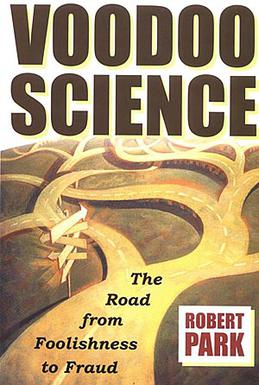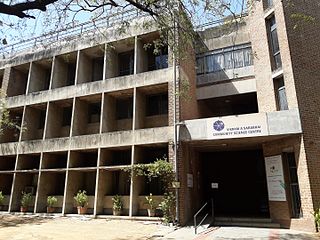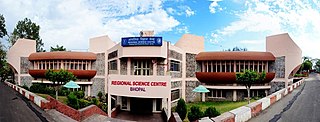
Voodoo Science: The Road from Foolishness to Fraud is a book published in 2000 by physics professor Robert L. Park, critical of research that falls short of adhering to the scientific method. Other people have used the term "voodoo science", but amongst academics it is most closely associated with Park. Park offers no explanation as to why he appropriated the word voodoo to describe the four categories detailed below. The book is critical of, among other things, homeopathy, cold fusion and the International Space Station.
Jitendra Jatashankar Rawal is an Indian astrophysicist and scientific educator, recognized for his work in the popularisation of science.

Kerala Sasthra Sahithya Parishad (KSSP) (lit. 'Kerala Science Literature Movement') is a prominent science and literature organization based in the Indian state of Kerala. It was founded in 1962 with the aim of promoting scientific temper, rational thinking, and a scientific approach to societal issues. The organization has played a significant role in popularizing science and scientific knowledge among the general public, particularly in the Malayalam-speaking region.

Vikram A Sarabhai Community Science Centre, commonly known as VASCSC, was established in the 1960s by the eminent space scientist, Vikram Sarabhai in Ahmedabad, Gujarat, India. The centre works towards popularising science and mathematics education among students, teachers and the public. Its mandate is to stimulate interest, encourage and expose the principles of science and scientific method and also to improve and find innovative methods of science education. It is located opposite Gujarat University. VASCSC is open to all members of the community.
Science outreach, also called education and public outreach or simply public outreach, is an umbrella term for a variety of activities by research institutes, universities, and institutions such as science museums, aimed at promoting public awareness of science and making informal contributions to science education.
The term scientific temper is broadly defined as "a modest open-minded temper—develop new light, new knowledge, new experiments, even when their results are unfavourable to preconceived opinions and long-cherished theories." It is a way of life which uses the scientific method and which may, consequently, include questioning, observing physical reality, testing, hypothesizing, analyzing, and communicating. Discussion, argument and analysis are vital parts of scientific temper. It aims to inculcate the values of scientific thinking, appreciate scientific development, and drive away superstition, religious bigotry, and all forms of pseudo-science.

Eugène Lafont, S.J., was a Belgian Jesuit priest, who became a missionary in India, where he became a noted scientist and the founder of the first Scientific Society in India.

Arvind Gupta is an Indian science educator, toy inventor, author, translator and scientist. He received the civilian award Padma Shree from the Indian government on the eve of Republic Day, 2018.
Paschim Banga Natya Akademi is a learned society for drama and theatre in West Bengal, India. Established on 26 September 1987, it is a wing of the Department of Information and Cultural Affairs, Government of West Bengal. The aim of this society is to develop skill and expertise, to document and archive the history of Bengali theatre, to disseminate information, to understand theories, as well as to promote and project significant creativity in the field.

The Regional Science Centre, Bhopal (RSCB) is located in the Shyamla Hills area of Bhopal, India. It is aimed at popularizing science and technology among the people, particularly the students. It is one of the constituent units of the National Council of Science Museums or NCSM. RSCB was inaugurated on 12 January 1995 by the then president of India Shankar Dayal Sharma.
Pushpa Mittra Bhargava was an Indian scientist, writer, and administrator. He founded the Centre for Cellular and Molecular Biology, a federally funded research institute, in Hyderabad. He was outspoken and highly influential in the development of scientific temper in India, and argued that scientific rationalism needed to be cultivated as a civic duty.
Superstition refers to any belief or practice that is caused by supernatural causality, and which contradicts modern science. Superstitious beliefs and practices often vary from one person to another or from one culture to another.
Development and Educational Communication Unit is an arm of Indian Space Research Organisation which aims at planning and imparting training the personnel for usage of satellite based communication systems for societal needs. The main objective of the organisation is to plan and envisage satellite usage for the general population in domains such as education and medicine, as well as many others.
Narender K. Sehgal was an Indian physicist, scientific administrator, and science populariser. He was born in Lahore. He worked as Scientific Officer in the Theoretical Reactor Physics Division of Bhabha Atomic Research Centre. In 1963 he went to US for his MSc and PhD in particle physics from the University of Wisconsin–Madison. He became professor of physics at the Somali National University in Magadiscio, East Africa. He returned to India in 1978 as visiting scientist at the Space Applications Centre (SAC) of Indian Space Research Organisation (ISRO). In 1982 he joined the Department of Science and Technology of the Government of India. He was head of the National Council for Science and Technology Communication (NCSTC) and later Vigyan Prasar, where he remained until his retirement in 2000.
Physics outreach encompasses facets of science outreach and physics education, and a variety of activities by schools, research institutes, universities, clubs and institutions such as science museums aimed at broadening the audience for and awareness and understanding of physics. While the general public may sometimes be the focus of such activities, physics outreach often centers on developing and providing resources and making presentations to students, educators in other disciplines, and in some cases researchers within different areas of physics.

The National Academy of Agricultural Sciences (NAAS) is a Government of India funded agency, established in 1990, is a research platform in the fields of crop husbandry, animal husbandry, fisheries and agro-forestry. It acts as a research base for agro-scientists to formulate their advice to the policy makers in discussion with the agricultural and agro industrial communities. The Academy is located at the National Agricultural Science Centre Complex, Pusa, in New Delhi, India.
The National Council for Science and Technology Communication (NCSTC) is a scientific programme of the Government of India for the popularisation of science, dissemination of scientific knowledge and inculcation of scientific temper. Established under the Department of Science and Technology, it "is mandated to communicate Science and Technology to masses, stimulate scientific and technological temper and coordinate and orchestrate such efforts throughout the country." Following the science communication plan introduced in the Sixth Five-Year Plan of India, NCSTC was established in 1982.
DD Science is a 2019 Indian science television series that aired on national television Doordarshan. It is a one-hour program on science and technology created by Vigyan Prasar, an autonomous organization under the Department of Science and Technology (DST), in association with the public broadcaster, Doordarshan.

Dwarkanath Gangopadhyay was a Brahmo reformer in Bengal, British India. He made substantial contributions towards societal enlightenment and the emancipation of women. Ganguly dedicated his life to the latter cause, encouraging women to participate in politics and the social services. He was the husband of the first female Indian physician, Kadambini Ganguly.

Ellora Vigyan Mancha is a non- profitmaking, non-governmental organization established in May 2004 in Assam, India, to Spread scientific temper and to fight superstition and blind belief, launch campaigns and movement for health awareness, climate change, encourage blood donation/ eye donation/ other human organ(s) donation/ whole body donation after death for transfusion, transplantation or medical research., and to Instill a sense of fraternity in people through selfless humanitarian service.








